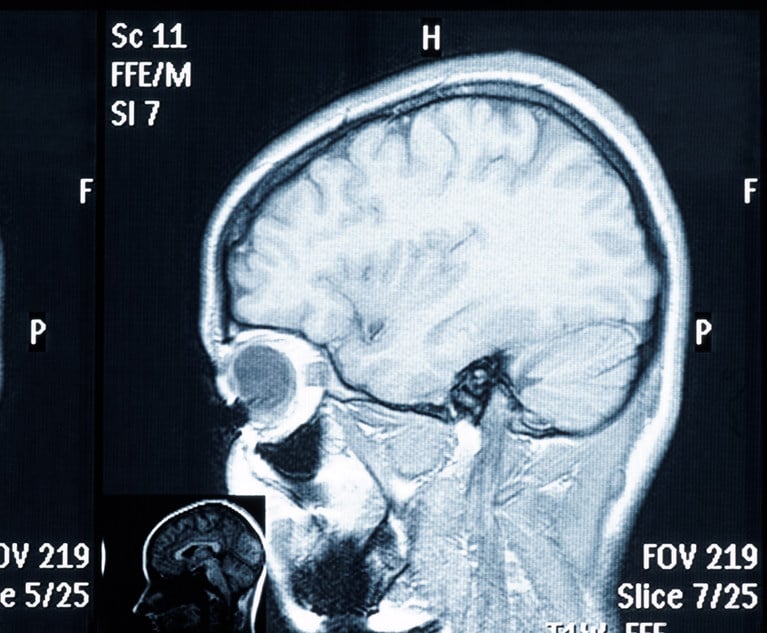NJ Appellate Division Upholds Priority of Mortgage Over Life Estate
The New Jersey Appellate Division affirmed a ruling granting summary judgment in favor of a plaintiff-mortgagee and against defendants who both held a life estate in the subject property.
September 04, 2017 at 03:05 PM
10 minute read
In Ocwen Loan Services v. Quinn, a decision rendered in October of 2016, but recently approved for publication at 2016 N.J. Super. LEXIS 167 (App. Div. 2016), the New Jersey Appellate Division affirmed the ruling of the Superior Court, Passaic County, granting summary judgment in favor of a plaintiff-mortgagee and against defendants who both held a life estate in the subject property. (The New Jersey Supreme Court denied certiorari on Feb. 7, 2017.)
In so doing, the court found that, although the defendants did not sign the plaintiff's mortgage, their life estates were subordinated based on the principles of replacement and modification, as well as the equitable principles recognized by the court in Sovereign Bank v. Gillis, 432 N.J. Super. 36 (App. Div. 2013).
The facts regarding the underlying foreclosure action were undisputed. The plaintiff sought to foreclose on a Sept. 21, 2007, refinance loan in the amount of $380,000 executed by defendant Marla Wuebbens Quinn in favor of IndyMac Bank, F.S.B. Previously, on Nov. 12, 2004, Quinn's parents, defendants Louisa Wuebbens and David Wuebbens, deeded the subject property to Quinn and retained life estates for themselves. In the deed reserving the life estates, the Wuebbens agreed to remain responsible for maintenance and upkeep of the property, including the payment of taxes and insurance. The 2007 mortgage paid off a prior 2005 mortgage loan in the amount of $260,000, also in favor of IndyMac, which was executed by Quinn, her husband Thomas Francis Quinn, and the Wuebbens. The title commitment IndyMac obtained for the 2007 mortgage did not disclose the existence of the Wuebbens' life estates, and they were therefore not asked to, and did not, execute the 2007 mortgage.
This content has been archived. It is available through our partners, LexisNexis® and Bloomberg Law.
To view this content, please continue to their sites.
Not a Lexis Subscriber?
Subscribe Now
Not a Bloomberg Law Subscriber?
Subscribe Now
NOT FOR REPRINT
© 2025 ALM Global, LLC, All Rights Reserved. Request academic re-use from www.copyright.com. All other uses, submit a request to [email protected]. For more information visit Asset & Logo Licensing.
You Might Like
View All


The Real Estate Consumer Protection Enhancement Act Brings Industry Change
9 minute readTrending Stories
- 1Thursday Newspaper
- 2Public Notices/Calendars
- 3Judicial Ethics Opinion 24-117
- 4Rejuvenation of a Sharp Employer Non-Compete Tool: Delaware Supreme Court Reinvigorates the Employee Choice Doctrine
- 5Mastering Litigation in New York’s Commercial Division Part V, Leave It to the Experts: Expert Discovery in the New York Commercial Division
Who Got The Work
J. Brugh Lower of Gibbons has entered an appearance for industrial equipment supplier Devco Corporation in a pending trademark infringement lawsuit. The suit, accusing the defendant of selling knock-off Graco products, was filed Dec. 18 in New Jersey District Court by Rivkin Radler on behalf of Graco Inc. and Graco Minnesota. The case, assigned to U.S. District Judge Zahid N. Quraishi, is 3:24-cv-11294, Graco Inc. et al v. Devco Corporation.
Who Got The Work
Rebecca Maller-Stein and Kent A. Yalowitz of Arnold & Porter Kaye Scholer have entered their appearances for Hanaco Venture Capital and its executives, Lior Prosor and David Frankel, in a pending securities lawsuit. The action, filed on Dec. 24 in New York Southern District Court by Zell, Aron & Co. on behalf of Goldeneye Advisors, accuses the defendants of negligently and fraudulently managing the plaintiff's $1 million investment. The case, assigned to U.S. District Judge Vernon S. Broderick, is 1:24-cv-09918, Goldeneye Advisors, LLC v. Hanaco Venture Capital, Ltd. et al.
Who Got The Work
Attorneys from A&O Shearman has stepped in as defense counsel for Toronto-Dominion Bank and other defendants in a pending securities class action. The suit, filed Dec. 11 in New York Southern District Court by Bleichmar Fonti & Auld, accuses the defendants of concealing the bank's 'pervasive' deficiencies in regards to its compliance with the Bank Secrecy Act and the quality of its anti-money laundering controls. The case, assigned to U.S. District Judge Arun Subramanian, is 1:24-cv-09445, Gonzalez v. The Toronto-Dominion Bank et al.
Who Got The Work
Crown Castle International, a Pennsylvania company providing shared communications infrastructure, has turned to Luke D. Wolf of Gordon Rees Scully Mansukhani to fend off a pending breach-of-contract lawsuit. The court action, filed Nov. 25 in Michigan Eastern District Court by Hooper Hathaway PC on behalf of The Town Residences LLC, accuses Crown Castle of failing to transfer approximately $30,000 in utility payments from T-Mobile in breach of a roof-top lease and assignment agreement. The case, assigned to U.S. District Judge Susan K. Declercq, is 2:24-cv-13131, The Town Residences LLC v. T-Mobile US, Inc. et al.
Who Got The Work
Wilfred P. Coronato and Daniel M. Schwartz of McCarter & English have stepped in as defense counsel to Electrolux Home Products Inc. in a pending product liability lawsuit. The court action, filed Nov. 26 in New York Eastern District Court by Poulos Lopiccolo PC and Nagel Rice LLP on behalf of David Stern, alleges that the defendant's refrigerators’ drawers and shelving repeatedly break and fall apart within months after purchase. The case, assigned to U.S. District Judge Joan M. Azrack, is 2:24-cv-08204, Stern v. Electrolux Home Products, Inc.
Featured Firms
Law Offices of Gary Martin Hays & Associates, P.C.
(470) 294-1674
Law Offices of Mark E. Salomone
(857) 444-6468
Smith & Hassler
(713) 739-1250







